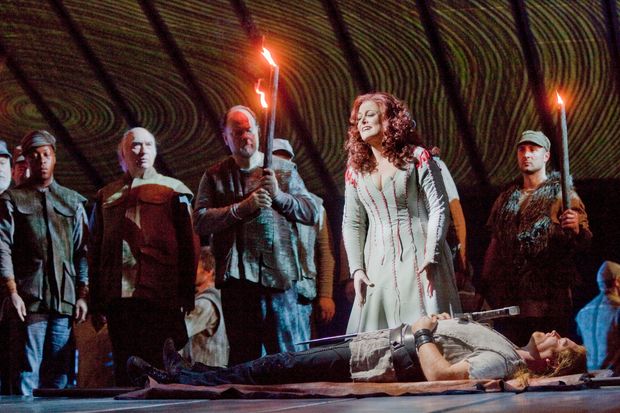A good read from today's WSJ
The Unstoppable Power of Music
Recordings and streams of classical performances have exploded in popularity in the time of social distancing.
By Barbara Jepson
May 19, 2020 4:59 pm ET

Kurt Masur leads the New York Philharmonic in Brahms’s ‘German Requiem’
PHOTO: CHRIS LEE
Under normal circumstances, classical-music videos posted online by opera companies, orchestras and soloists may take years to exceed the million-viewer mark, if they reach it at all. But consider these startling numbers, gathered after music institutions canceled the remainder of their seasons in response to the coronavirus restrictions: When the Metropolitan Opera offered Bizet’s “Carmen” to the public as the first of its free, ongoing “Nightly Opera Streams” of past performances, its website crashed due to the unprecedented demand; rebroadcasts have subsequently attracted about 7.9 million people world-wide.
In the orchestral realm, when the Seattle Symphony streamed a September 2019 performance of Mahler’s First on two evenings, about 132,000 listeners tuned in, compared with 4,835 individuals who had purchased tickets for one of the three original live concerts. Since the Boston Symphony Orchestra launched its “BSO at Home” series, its website and social media platforms have received more than six million interactions, with website traffic 124% higher than usual. And pop tenor Andrea Bocelli’s Easter recital of sacred-music favorites with organ accompaniment drew more than 2.8 million concurrent viewers, making it the largest simultaneous audience for a classical livestream in YouTube history. (The latest count is nearly 40 million.)
For decades, there have been dire warnings and disheartening statistics about shrinking classical audiences—because of aging patrons, changing tastes and more competition for the entertainment dollar. Do these recent, higher numbers mean there’s a larger, untapped audience for classical music than we usually think? Or does the enthusiastic response to these classical webcasts merely reflect the chance to hear free concerts in the privacy of our homes, without the usual scheduling issues, transportation hassles, and total expenses involved? We can’t know for sure.
But one thing is clear: Music is engaging more people right now than most other art forms. What accounts for its powerful effect on us? The ancient Greek philosophers Plato and Aristotle recognized music’s uncanny ability to influence the emotions and prescribed which of the “modes”—akin to major and minor harmonic scales—were suitable for students and soldiers. Research with functional MRIs has demonstrated that listening to music activates multiple areas of the brain and involves higher-level cognitive functioning. Might it then provide a more absorbing level of distraction from the coronavirus pandemic?

A Met Opera production of Wagner’s ‘Götterdämmerung’’
PHOTO: KEN HOWARD/METROPOLITAN OPERA
When words fail, music can help us speak—a therapeutic result observed in shellshock victims following World War I. After the 9/11 attacks, Kurt Masur’s memorial performance of the consoling Brahms “German Requiem” with the New York Philharmonic provided an opportunity for a stricken city to express collective grief for the dead. (On May 25, the 2001 concert will be rebroadcast on Facebook and YouTube at 5:30 p.m. EDT.) Although the event was broadcast nationwide by “Live From Lincoln Center” on PBS, hundreds of people stood on the plaza in a light rain, listening to the 75-minute “Requiem” via an audio-video hookup.
The personal and economic disruptions of the coronavirus crisis will change our world even more than 9/11 did. Although it may sound clichéd, the best works in the Western classical canon have an inherent nobility, order and spiritual sustenance that may be particularly meaningful in times of uncertainty. I especially value music’s immersive qualities—the heightened awareness that comes from tracking how themes recur, coalesce or clash, or noticing the way a performer brings out an inner voice in the larger compositional fabric.
Early in the pandemic, I kept returning to the latest album by Icelandic pianist Víkingur Ólafsson, which includes sprightly solo pieces by the 18th-century French composer Jean-Philippe Rameau. Hungry for all-too-elusive good news, I savored their cheerful insouciance.
Later, as media images of exhausted medical personnel, coronavirus sufferers on ventilators and stacked coffins awaiting burial lingered in memory, I sat glued to my laptop, watching the Met’s rebroadcast of Wagner’s “Ring” cycle, a personal favorite, for four nights. As usual, I reveled in the low brass passages, long-lined vocal writing and fateful, if convoluted, story line. Yet this time around, I was more aware of how Wagner repeatedly sustains harmonic tension by delaying the resolution of dissonance.
And my reactions were different. One of my favorite moments occurs during Act Three of the second opera, “Die Walkure,” when the despondent Sieglinde learns that she is carrying the child of Siegmund, her murdered husband. The Valkyrie Brünnhilde announces that this future hero will be Siegfried, triggering a brief, rhapsodic outburst by Sieglinde known as the “Transformation” motif. The motif recurs in the final opera, “Götterdämmerung,” most notably at the end, when it helps signal the beginning of a renewed, better world. Normally, I find its stirring melody exhilarating. But during the rebroadcast, when the “Transformation” theme returned, it helped me to express my often-delayed reactions to unexpected or tragic events.
Now, as the coronavirus curve flattens but the death toll continues its inexorable rise, the “Funeral March” to Beethoven’s “Eroica” Symphony has become an earworm. The somber beauty of its opening theme gives way to lyrical grace. The soaring fugue near the end, followed by the blazing brass and propulsive rhythms that precede the opening theme’s return, is a testament to human resilience in the face of loss.
One day we will gather once more in the world’s concert halls to the heartening sounds of live performance. Until then, I’m grateful for the opportunity to experience such a wealth of classical music communally via online videos, livestreams and rebroadcasts. Sheltering in place, we can still journey into a composer’s world, briefly leaving this one behind.
—Ms. Jepson reviews classical albums and concerts for the Journal.
The Unstoppable Power of Music
Recordings and streams of classical performances have exploded in popularity in the time of social distancing.
By Barbara Jepson
May 19, 2020 4:59 pm ET

Kurt Masur leads the New York Philharmonic in Brahms’s ‘German Requiem’
PHOTO: CHRIS LEE
Under normal circumstances, classical-music videos posted online by opera companies, orchestras and soloists may take years to exceed the million-viewer mark, if they reach it at all. But consider these startling numbers, gathered after music institutions canceled the remainder of their seasons in response to the coronavirus restrictions: When the Metropolitan Opera offered Bizet’s “Carmen” to the public as the first of its free, ongoing “Nightly Opera Streams” of past performances, its website crashed due to the unprecedented demand; rebroadcasts have subsequently attracted about 7.9 million people world-wide.
In the orchestral realm, when the Seattle Symphony streamed a September 2019 performance of Mahler’s First on two evenings, about 132,000 listeners tuned in, compared with 4,835 individuals who had purchased tickets for one of the three original live concerts. Since the Boston Symphony Orchestra launched its “BSO at Home” series, its website and social media platforms have received more than six million interactions, with website traffic 124% higher than usual. And pop tenor Andrea Bocelli’s Easter recital of sacred-music favorites with organ accompaniment drew more than 2.8 million concurrent viewers, making it the largest simultaneous audience for a classical livestream in YouTube history. (The latest count is nearly 40 million.)
For decades, there have been dire warnings and disheartening statistics about shrinking classical audiences—because of aging patrons, changing tastes and more competition for the entertainment dollar. Do these recent, higher numbers mean there’s a larger, untapped audience for classical music than we usually think? Or does the enthusiastic response to these classical webcasts merely reflect the chance to hear free concerts in the privacy of our homes, without the usual scheduling issues, transportation hassles, and total expenses involved? We can’t know for sure.
But one thing is clear: Music is engaging more people right now than most other art forms. What accounts for its powerful effect on us? The ancient Greek philosophers Plato and Aristotle recognized music’s uncanny ability to influence the emotions and prescribed which of the “modes”—akin to major and minor harmonic scales—were suitable for students and soldiers. Research with functional MRIs has demonstrated that listening to music activates multiple areas of the brain and involves higher-level cognitive functioning. Might it then provide a more absorbing level of distraction from the coronavirus pandemic?

A Met Opera production of Wagner’s ‘Götterdämmerung’’
PHOTO: KEN HOWARD/METROPOLITAN OPERA
When words fail, music can help us speak—a therapeutic result observed in shellshock victims following World War I. After the 9/11 attacks, Kurt Masur’s memorial performance of the consoling Brahms “German Requiem” with the New York Philharmonic provided an opportunity for a stricken city to express collective grief for the dead. (On May 25, the 2001 concert will be rebroadcast on Facebook and YouTube at 5:30 p.m. EDT.) Although the event was broadcast nationwide by “Live From Lincoln Center” on PBS, hundreds of people stood on the plaza in a light rain, listening to the 75-minute “Requiem” via an audio-video hookup.
The personal and economic disruptions of the coronavirus crisis will change our world even more than 9/11 did. Although it may sound clichéd, the best works in the Western classical canon have an inherent nobility, order and spiritual sustenance that may be particularly meaningful in times of uncertainty. I especially value music’s immersive qualities—the heightened awareness that comes from tracking how themes recur, coalesce or clash, or noticing the way a performer brings out an inner voice in the larger compositional fabric.
Early in the pandemic, I kept returning to the latest album by Icelandic pianist Víkingur Ólafsson, which includes sprightly solo pieces by the 18th-century French composer Jean-Philippe Rameau. Hungry for all-too-elusive good news, I savored their cheerful insouciance.
Later, as media images of exhausted medical personnel, coronavirus sufferers on ventilators and stacked coffins awaiting burial lingered in memory, I sat glued to my laptop, watching the Met’s rebroadcast of Wagner’s “Ring” cycle, a personal favorite, for four nights. As usual, I reveled in the low brass passages, long-lined vocal writing and fateful, if convoluted, story line. Yet this time around, I was more aware of how Wagner repeatedly sustains harmonic tension by delaying the resolution of dissonance.
And my reactions were different. One of my favorite moments occurs during Act Three of the second opera, “Die Walkure,” when the despondent Sieglinde learns that she is carrying the child of Siegmund, her murdered husband. The Valkyrie Brünnhilde announces that this future hero will be Siegfried, triggering a brief, rhapsodic outburst by Sieglinde known as the “Transformation” motif. The motif recurs in the final opera, “Götterdämmerung,” most notably at the end, when it helps signal the beginning of a renewed, better world. Normally, I find its stirring melody exhilarating. But during the rebroadcast, when the “Transformation” theme returned, it helped me to express my often-delayed reactions to unexpected or tragic events.
Now, as the coronavirus curve flattens but the death toll continues its inexorable rise, the “Funeral March” to Beethoven’s “Eroica” Symphony has become an earworm. The somber beauty of its opening theme gives way to lyrical grace. The soaring fugue near the end, followed by the blazing brass and propulsive rhythms that precede the opening theme’s return, is a testament to human resilience in the face of loss.
One day we will gather once more in the world’s concert halls to the heartening sounds of live performance. Until then, I’m grateful for the opportunity to experience such a wealth of classical music communally via online videos, livestreams and rebroadcasts. Sheltering in place, we can still journey into a composer’s world, briefly leaving this one behind.
—Ms. Jepson reviews classical albums and concerts for the Journal.

